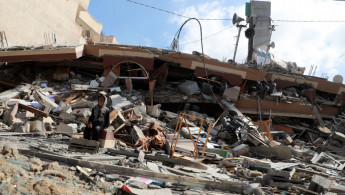ICC must probe Israeli bombing of Gaza homes as 'war crimes': Amnesty International
Amnesty International urged the ICC to probe Israeli bombing of homes in Gaza as war crimes on Monday.
The London-based NGO said it had identified "four deadly attacks" conducted by Israel against properties in the Strip where no advanced warning was provided.
The human rights organisation said locals informed them there was nothing militarily relevant in the areas hit when the bombardment occurred, despite Israeli claims it only acts in such cases.
Amnesty deputy Middle East and North Africa Director Saleh Higazi said these were "brazen deadly attacks on family homes".
He added: "Israel has demonstrated a callous disregard for lives of Palestinian civilians who are already suffering the collective punishment of Israel’s illegal blockade on Gaza since 2007."
"Deliberate attacks on civilians and civilian property and infrastructure are war crimes, as are disproportionate attacks," Higazi continued.
Noting the International Criminal Court's ongoing probe into the region, he called on it to "urgently investigate these attacks as war crimes".
Read more: As Eid begins, Palestinian Muslims and Christians unite against violence and displacement
"States should also consider exercising universal jurisdiction over those who commit war crimes," he added.
Universal jurisdiction is a principle under which countries around the world can prosecute for particularly grave violations of international law committed outside their territories.
"Impunity only works to fuel the pattern of unlawful attacks and civilian bloodshed, which have we have repeatedly documented in previous Israeli military offensives on Gaza," Higazi explained.
One attack on 16 May saw 30 killed, including 11 children.
The UN Security Council will hold an emergency meeting Tuesday amid a flurry of urgent diplomacy aimed at stemming Israeli air strikes that have killed more than 200 Palestinians. https://t.co/g348hB7L1T
— The New Arab (@The_NewArab) May 18, 2021
The bombing, which occurred between 1am and 2am, wiped out the Gazan ministry of labour and two residential buildings.
Youssef Yassin, who works at Al-Shifa Hospital as a medic, assisted the Red Crescent in rescuing survivors, after being among the earliest to reach the site of the attack
He explained to Amnesty: I helped get out four dead [bodies], but there were many more.
"It was very hard. There was no warning, so people were inside their home sitting together, and this is a lively, bustling area."
A previous attack on 14 May, occurring just prior to midnight, saw Lamya Hassan Mohammed Al-Atar, 28, a mother, killed alongside her baby, who was just eight months old, and her two other children.
Her father Hassan informed Amnesty he "was shocked".
After struggling to locate anyone "the rescue team arrived to help and we eventually found [his family]… under one of the cement pillars of the house; all of them were dead", he said.
"The other residents seem to have managed to escape from an opening after the bombing and got to the hospital."
Al Mezan Center for Human Rights, which operates from Gaza, said on Sunday that 152 "residential units" were wiped out in a 24-hour period.
The United Nations Office for the Coordination of Humanitarian Affairs said over 2,500 Gazans have lost residences, with 38,000 internally displaced turning to UN-run schools for refuge.
The bombardment has also impacted water, electrical and medical provision, and stopped the North Gaza Seawater Desalination Plant being used.
The facility provides over 250,000 individuals with water.
Amnesty International also criticised "[i]ndiscriminate rocket-fire by Palestinian armed groups towards civilian areas of Israel".
Noting civilians have died, been wounded, and seen homes harmed by these rockets, it said they are "by nature indiscriminate" and called on the ICC to look into them as war crimes too.





 Follow the Middle East's top stories in English at The New Arab on Google News
Follow the Middle East's top stories in English at The New Arab on Google News


